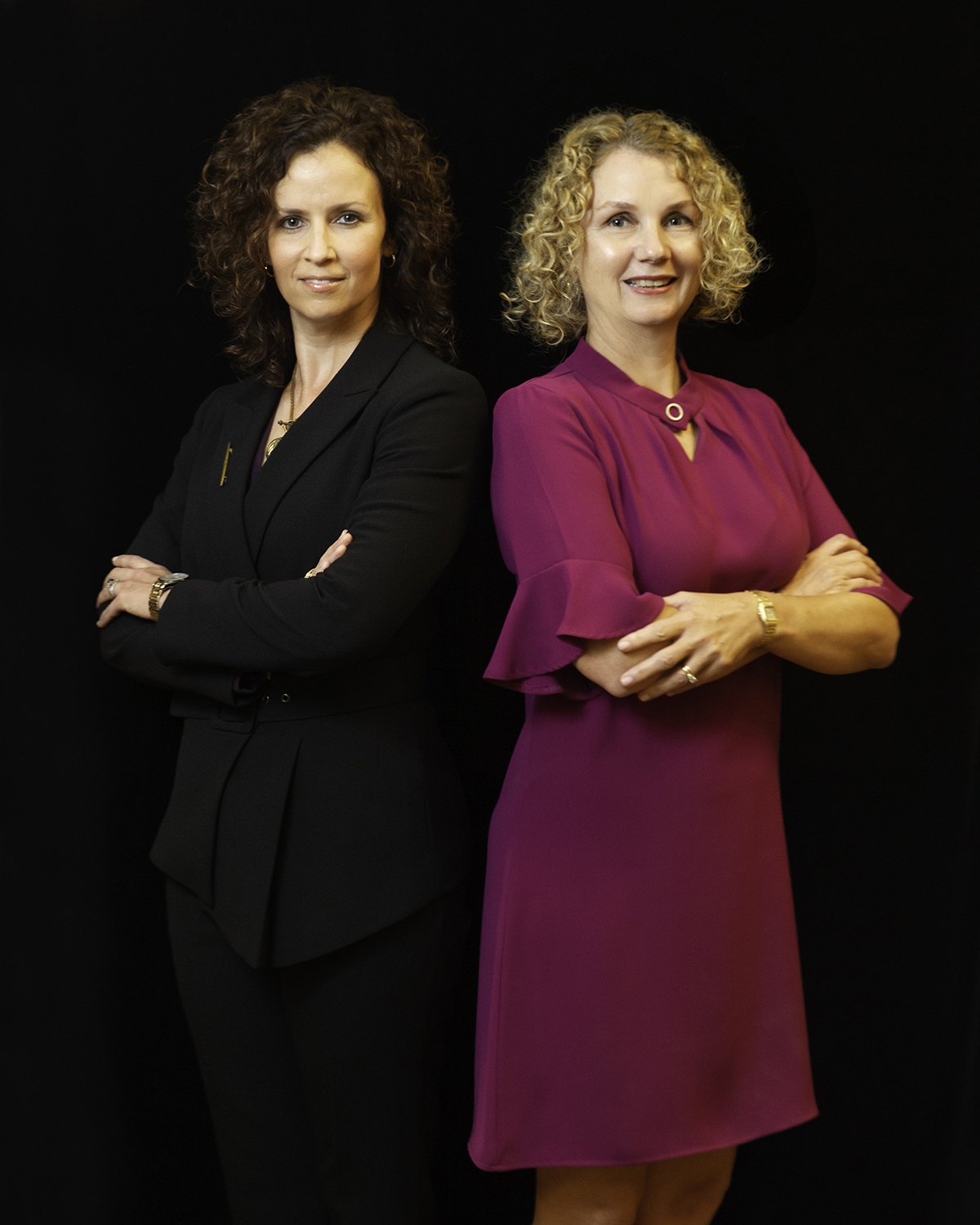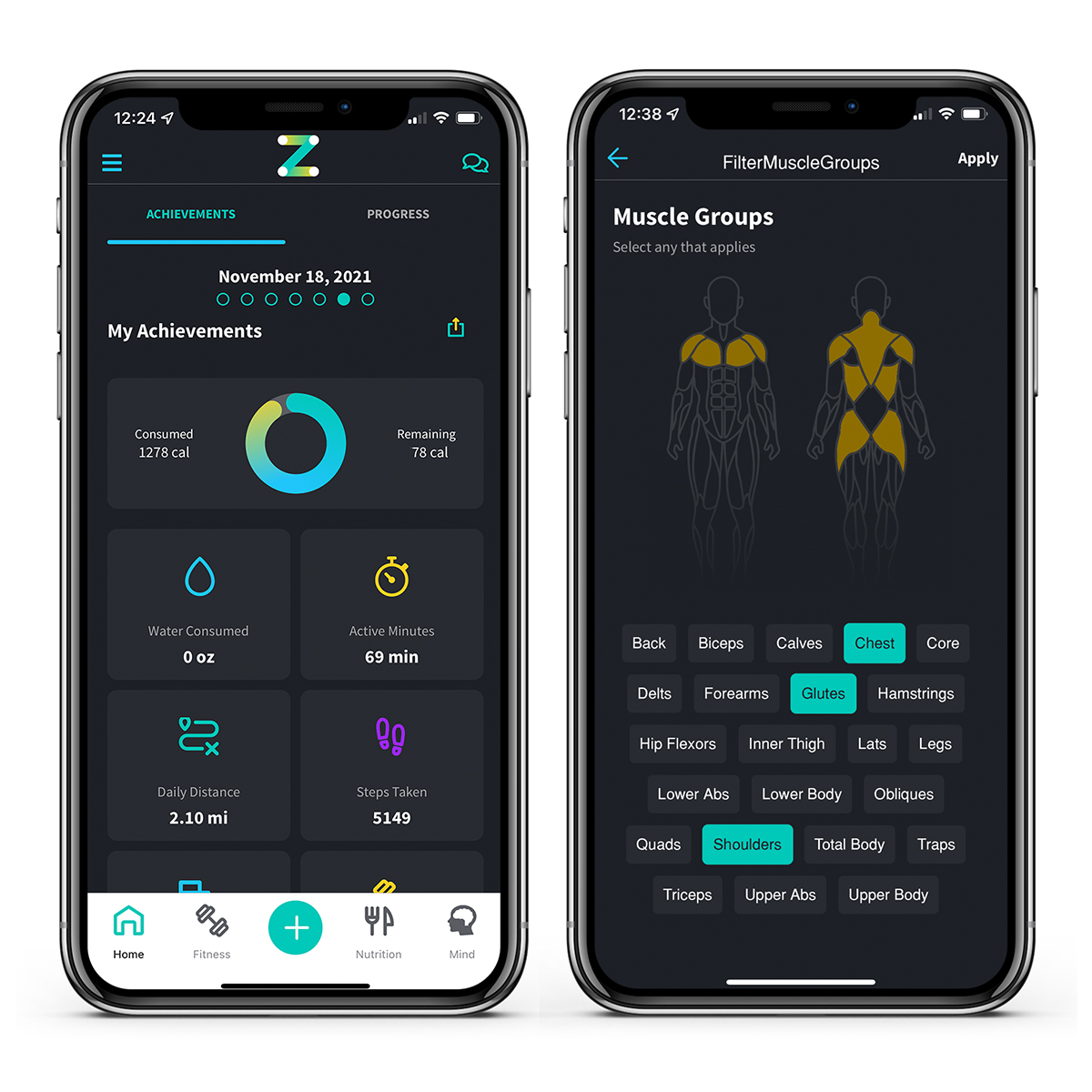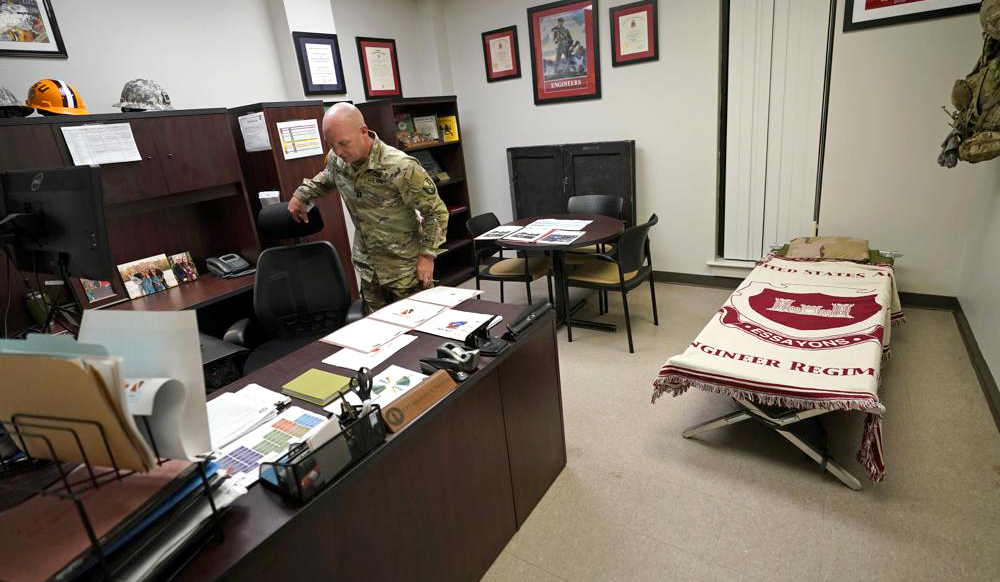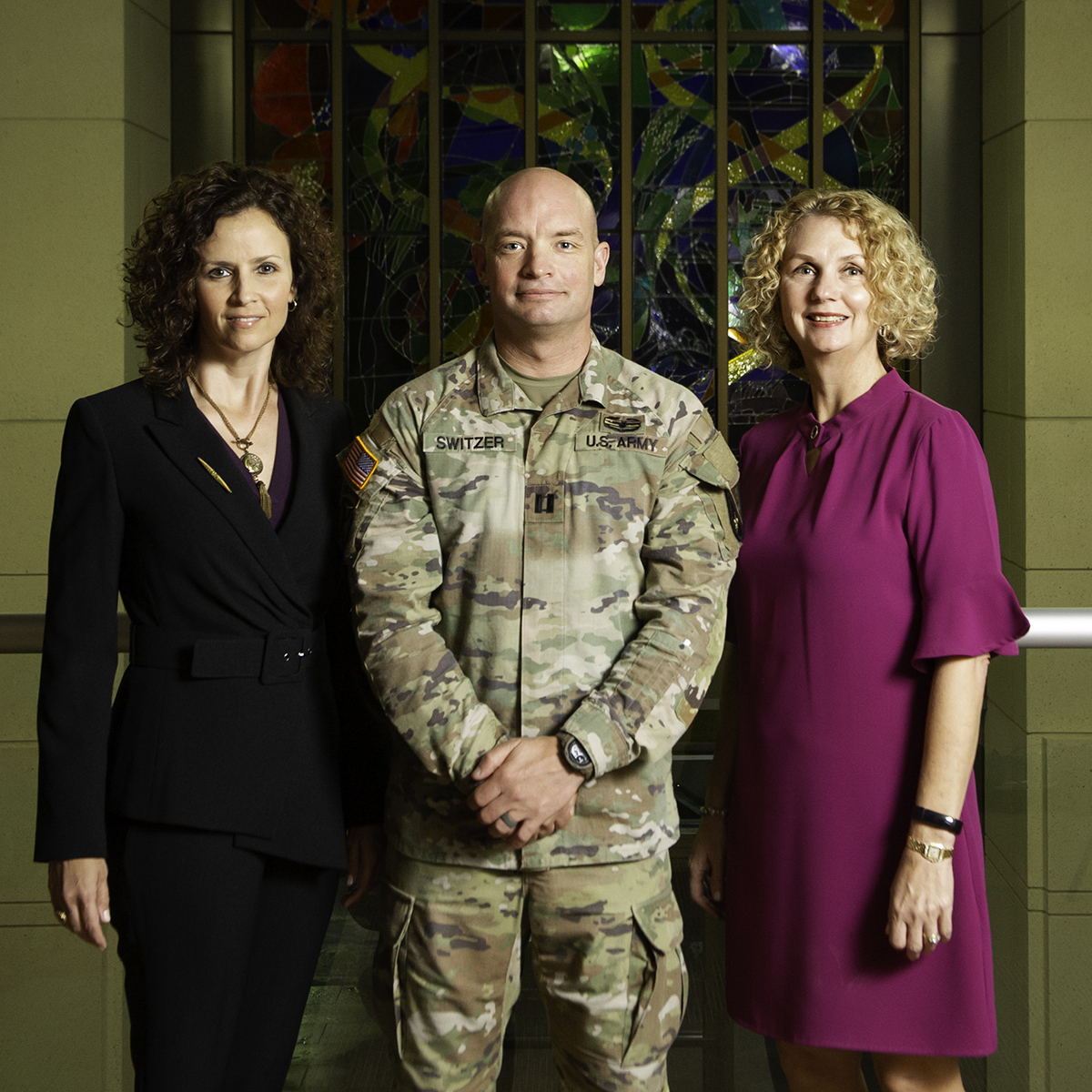LSU PBRC Researchers Leverage Biomedical Science and Technology to Better Feed, Train, Support U.S. Soldiers—and Everyone
January 18, 2022
Researchers at LSU’s Pennington Biomedical Research Center (PBRC) are putting 20 years of knowledge from working with soldiers into a new app for everyone, a one-stop shop for body and mind health. It’s called Z!G and although powered by artificial intelligence, it’s not looking for perfection.

Pennington Biomedical researchers Tiffany Stewart and Jennifer Rood have together spent decades working with the Department of Defense to help soldiers both physiologically and psychologically. They jokingly refer to each other as “the body” and “the brain.” Rood (right) is a pathologist and microbiologist focused on nutrition, exercise, and injury among high performers, while Stewart (left) is a clinical psychologist who specializes in eating disorders, obesity, and mental health and optimization.
– Elsa Hahne / LSU
Baton Rouge—Over the past 30 years, scientists at PBRC have fundamentally changed how American soldiers eat. As the number-one provider of nutrition science for the U.S. Department of Defense (DOD), PBRC researchers are helping to secure the nation by making sure soldiers get the food and drink they need to optimize their performance and protect against injury.
The work impacts every branch of the military—Army, Navy, Air Force, etc. And by leveraging technology, the researchers are putting science to work in the hands of men and women on active duty, as well as their families. A prime example is through the Army H.E.A.L.T.H. (Healthy Eating, Activity, Lifestyle Training Headquarters) app, which more than 15,000 U.S. soldiers have used so far, with regular users improving their performance on physical fitness tests and meeting military weight standards. Unlike most other lifestyle apps where the focus might be on either weight-loss or mental wellness, Army H.E.A.L.T.H. takes a more integrated, whole-health approach, incorporating tools related to weight, nutrition, and fitness—all integrated with sleep and stress management and mood and mindfulness support. The app offers personalized tools to help users reach specific goals, or just do and feel better on a day-to-day basis.
The Army is now talking with PBRC about making the app available DOD-wide through its own secure “app store.” To date, the DOD has invested $18 million over 15 years in the development of this program. Meanwhile, the researchers are taking everything they’ve learned from working with soldiers and many of the best parts of Army H.E.A.L.T.H. and retooling them into a new app called Z!G for the general population, which is struggling with many of the same challenges as active-duty soldiers. This includes first responders and frontline medical professionals, but also anyone who lives with high amounts of stress and uncertainty, which might be most of us.
“Working with the Louisiana National Guard has prepared us exceptionally well to be able to offer an effective tool for the general population.”
Tiffany Stewart, clinical psychologist and director of the Behavior Technology Laboratory at Pennington Biomedical
Through collaboration with the Louisiana National Guard (LANG), a customized version of the app has already been tested by a majority of the state’s soldiers and their family members, in all 64 Louisiana parishes. (The LANG maintains a total of 183 units in 44 parishes.)
“Working with the Louisiana National Guard has prepared us exceptionally well to be able to offer an effective tool for the general population,” said Tiffany Stewart, a clinical psychologist, director of the Behavior Technology Laboratory at Pennington Biomedical, and faculty lead for Army H.E.A.L.T.H. and Z!G. “Although they’re soldiers, national guard soldiers live among us as civilians. Besides being deployed overseas, they are often called in for domestic deployments on a moment’s notice, including for search and rescue during hurricanes, COVID-19, and so on—but they’re also driving kids to school, live in food deserts, and might struggle to get to the gym, same as we are.”

The new Z!G app translates 20 years of military science into a whole-health app for everyone. It includes everything from activity trackers, customized workouts, and stress-relieving tools to detailed grocery lists for nutritious meals to cook at home. The goal of the app, as the researchers describe it, is to help each individual user “not be perfect, but happy and healthy.”
– Pennington Biomedical Research Center / LSU
The retooled app includes custom workout generators, meal planning tools (complete with grocery lists), and interactive trackers that encourage incremental changes (“you’re on your way”) rather than piecemeal progress toward distant goals (“you’re not there yet”). The researchers have also recently added an artificial intelligence component, so the app can learn about its user and become more responsive to needs and preferences over time. The app was designed to be like a quiet, supportive coach in everyone’s pocket.
“When we first started talking with the Army about a program like this back in 2003,
people thought we were crazy,” Stewart said. “An anonymous, Internet-based program?
‘Nobody would use it,’ and, ‘How ridiculous.’ But it worked because it was anonymous
and automated. It took away the stigma of needing or asking for help—nobody had to
know you were struggling.”
“Also, this was the first tool soldiers and their families could use independently—anytime
and anywhere—to sustain health, readiness, and performance on a year-round basis,”
Stewart added. “The Army had never had programming like this before.”
“The Army had never had programming like this before.”
—Tiffany Stewart
One of the main motivations behind Army H.E.A.L.T.H. came with the realization in the early 2000s (post-9/11 and the beginning of the War on Terror) that the need for soldiers was increasing while the recruiting pool was shrinking. Today, roughly 70% of possible Army recruits are ineligible for service due to many reasons, with overweight and obesity at the forefront.
“Also, it became obvious that our active-duty soldiers were not immune to weight creep and the obesity epidemic,” Stewart explained. “What we were seeing in the general population was true in the Army as well. Soldiers were struggling to stay under established weight-height thresholds, battling diabetes and cardiovascular disease. And while we intended Army H.E.A.L.T.H. as a prevention tool, it’s often used for intervention.”

Captain Michael Switzer with the Louisiana National Guard (LANG) helped turn Army H.E.A.L.T.H. into LANG H.E.A.L.T.H. He’s been one of the app’s most frequent and vocal users. “H.E.A.L.T.H.” is a trademarked acronym for Healthy Eating Activity Lifestyle Training Headquarters. Going from deployment to deployment, as AP recently reported, Switzer sleeps most nights in his office at Camp Beauregard in Pineville, LA.
– Photo courtesy of Gerald Herbert / AP
Captain Michael Switzer with the LANG is the soldier perhaps most familiar with the LSU/Pennington-developed health app. Not only did he help design the app, but he and his wife have both used it, whether he’s home in Denham Springs (which hasn’t been a lot lately) or deployed. They’ve used the app to stay connected, work together toward shared goals, and—on occasion—compete with each other. Back in 2005, Switzer lost four men in his unit, including his best friend, during a deployment to Baghdad. He says the app’s mental health and mindfulness tools played an important role in his recovery from those losses combined with daily challenges.
“I've always been physically fit, that’s never been much of a struggle for me, but coming from three deployments, I was choking up a little bit,” Switzer said. “The mindfulness techniques in the program were really beneficial to me, especially coming home and transitioning back. If you don’t have tools for mental management, anxiety and depression can easily become obstacles for nutrition, fitness, and sleep, so it all goes together.”
More recently, Switzer has been deployed in Louisiana to help stage COVID-19 testing and vaccine sites, do emergency supply runs during storms, clear roads, and rebuild infrastructure. He spends most nights on a cot in his office.
“While the Army values military family time both here and overseas, at high op-tempo times, we don’t get to spend much time with our families,” Switzer said. “Sleeping is sometimes not even an option, so the best you can do is breathe and try to keep yourself calm.”
As a leader in charge of others, it’s not lost on Switzer that suicide rates in the military have been increasing. The National Guard is not immune to this trend. During Hurricane Ida, the LANG—one of the most deployed in the nation—lost at least one soldier to suicide. Dealing with that and general mental health management can be especially hard when you don’t have specialized mental health training, which is commonplace, Switzer said:
“The app has been a very good tool for me in my life, personally, but it’s also a great leadership tool. It’s helped me be a better resource for others.”
Captain Michael Switzer, Louisiana National Guard
“The app has been a very good tool for me in my life, personally, but it’s also a great leadership tool. It’s helped me be a better resource for others. You want to be able to counsel your subordinate soldiers and veterans in a positive way, and the app is something I can put in their hands and into the hands of younger leaders who are put in charge of soldiers.”
The latest version of the Army H.E.A.L.T.H. app can also help fresh recruits as well as experienced soldiers prepare for the new combat fitness test, which is replacing the older physical fitness test the Army was using since the 1980s (sit-ups, push-ups, and a two-mile run). The new test is designed as a better measurement of soldiers’ readiness on the battlefield and includes lifting, dragging, and carrying. All soldiers are required to pass the test and stay within a certain weight range.
Switzer values how the app has helped the LANG retain soldiers on all levels.

While Tiffany Stewart (left) and her team developed the original versions of their app for the entire U.S. Army, it was through collaboration with the Louisiana National Guard and by working with the majority of its civilian soldiers, including Captain Michael Switzer (center), that the researchers were able to transition the app into an effective tool for the general population. Jennifer Rood (right) is working on biomedical and nutrition research that is impacting not just the Army and the National Guard, but every branch of the U.S. military.
– Elsa Hahne / LSU
“When a soldier doesn’t meet weight standards or pass physical fitness tests, they can’t get promoted—instead, they lose many of the benefits you get from being in the military,” Switzer said. “Sometimes they become ineligible for bonuses, and, in the worst-case scenario, they may even be discharged. In the military, you must meet standards in order to be successful. So, the app is a tool that helps us with retention, which has become even more important as our recruiting pool is shrinking. It puts an evidence-based tool directly into the hands of the soldiers who need it the most.
In 2013, the first female U.S. Army surgeon general, Patricia D. Horoho, recognized the importance of treating soldiers holistically and more as equivalent to athletes. It was after Horoho endorsed the LSU-PBRC Army H.E.A.L.T.H. tool that the researchers were able to pilot it Army-wide.
“We’ve been in protracted wartime since 9/11, and our military needs its soldiers—they can’t just discharge them when they’re struggling to meet standards, because we desperately need to retain our fighting force,” Stewart said. “That’s one of the reasons our lab develops technologies to help people change their behaviors and realize that small steps can lead to big change. It’s hard to make habit changes in the context of chaos—whether that’s in the middle of a war or a pandemic or a hurricane, when you’re worried that you or people you care about could be hurt or die—but we want to show that you can do tiny things every day, in the context of real life, that build up to something meaningful.”
Jennifer Rood’s lab, meanwhile, has been working on biomarkers in soldiers’ blood that can help predict—and therefore prevent—injury, among other things. One of her recent studies showed that male soldiers who maintain normal testosterone levels can retain and even gain muscle mass while losing weight from fat stores during high-stress times, when they’re often not eating or sleeping enough. The U.S. Army Research Institute for Environmental Medicine has already invested tens of millions in her work, contributing to the more than $100 million the DOD has dedicated to research at PBRC over the past 30 years.
“It’s hard to make habit changes in the context of chaos—whether that’s in the middle of a war or a pandemic or a hurricane, when you’re worried that you or people you care about could be hurt or die—but we want to show that you can do tiny things every day, in the context of real life, that build up to something meaningful.”
Tiffany Stewart
While Rood’s research is making an impact on every branch of the U.S. military—world-wide—she personally cares more about the effect her work is having on specific people, closer to home.
“You might talk to other scientists, and they’ll say, ‘I discovered this,’ or ‘I put this new technique on the map,’ but for me, it’s more personal,” Rood said.
When she and her husband were finally able to go to an in-person LSU Tigers football game this season, a young man walked up to her and tapped her on the shoulder.
“I couldn’t place him at first,” Rood remembered. “But then I remembered him from one of our studies, and he told me how much he’d learned from it and the difference it’d made for him in his life. If you look at the big picture of the discoveries we’ve made, it’s probably a much bigger accomplishment, but for me, walking the streets of Baton Rouge and having people come up to me and tell me how they’ve been able to keep their cholesterol down, or get their diabetes in check, keep the weight off, or get on a new life-changing medication because of our research—that’s really powerful.”
“For the past three decades, the Pennington Biomedical Research Center and their expert staff have been key partners to the Army and Department of Defense in nutrition research. Together, we have made significant discoveries, which have resulted in improved health and performance of the modern Warfighter.”
James McClung, Military Nutrition Division, U.S. Army Research Institute of Environmental Medicine (USARIEM)
The development of the Z!G app for the general population was supported by a 2021 LIFT2 (Leveraging Innovation for Technology Transfer) grant from the LSU Board of Supervisors.
Read more:
Watch Tiffany Stewart’s TEDxLSU talk: “The Body Revolution We Need: Function over Form”
Watch Jennifer Rood speak with the Press Club of Baton Rouge about PBRC’s DOD partnership
MyHEALTH app—once only available to military—hits civilian app stores in 2021 (PBRC)